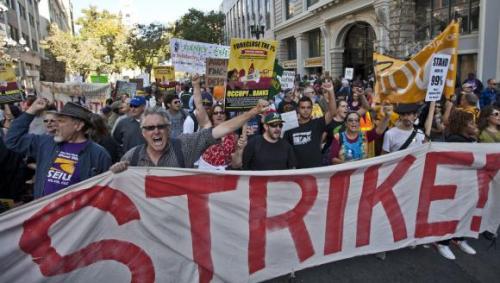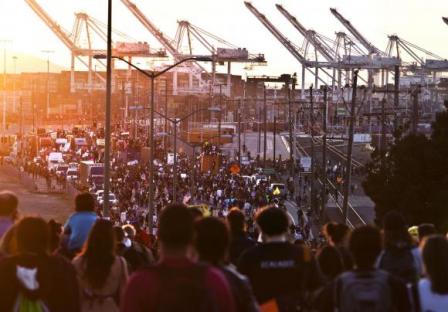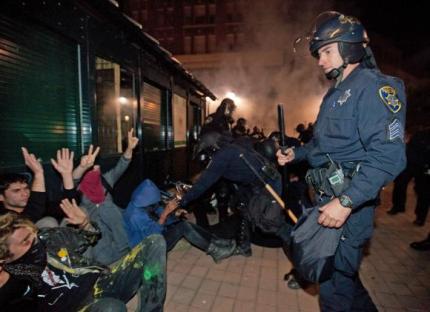You are here
Home ›The Oakland General Strike
The following articles are from Battaglia Comunista with an update from Internationalist Notes - US
It was very unusual general strike that occurred on Wednesday, November 2 in Oakland, where thousands of people marched through the city centre for hours and blocked port activities (the city, with about 400,000 inhabitants, is in the heart of San Francisco Bay. It is the fifth biggest U.S. port).
The call for a strike was not in fact due to the initiative of trade unions, but to the Occupy Oakland movement which in the document of the meeting states
The world is tired of the immense disparities of wealth caused by the system in which we live. It is time for people to do something. The general strike in Oakland is a warning shot for the 1% - their wealth only exists because 99% of us create it for them.
The document of the meeting goes on to add
banks and companies should be closed, otherwise we will demonstrate against them.
From the very beginning, the Occupy Oakland movement has been characterized by greater radicalism than in any of the other squares and parks occupations against neoliberalism and government austerity policies that are currently enlivening the United States. In the assembly of October 15 a large majority passed a motion calling on participants to support
strikes by workers which are called by the unions, or are spontaneous in all areas of San Francisco.
The attempt to unite the protest movement in the squares to workers’ struggles has characterized the actions of this movement.
We want to block the activity of the port and also express our solidarity with the struggle of the stevedores of the Port of Longview against the EGT.
For a long time the dockworkers of Oakland have been struggling with the port as the company is laying them off and replacing them with non-unionised labour (during the recent protests workers kidnapped security guards for a few hours and damaged the plant of machinery).
The appeal for mobilisation reads
EGT is an international exporter of grain that is trying to remove dockers’ rights. The company is controlled by an agribusiness multinational which made a 2.4 billion profit in 2010 and has close ties with Wall Street. This is just one example of the attack by Wall Street on workers.
The movement was attempting to seek to unite with the world of work, despite the big trade union federations (for example, the AFL-CIO and Change to Win) who initially tried to boycott the strike, by pointing to contractual clauses, but which, on second thoughts, chose to avoid a head-on confrontation by not clashing with local organisations (especially the dockers and teachers) and came out in favour of the strike move.
Since 1947, the year of approval of the Labor-Management Relations Act, also known as Taft-Hartley Act, strikes that are not related to labour disputes in one firm are illegal in the United States and therefore the union leaders have said that participating in the strike would have meant breaking the contracts they had already signed (legislation which obviously tends to fragment workers’ unity by containing their actions within corporate and single firm issues, thus reducing them to impotence from the political point of view).
The SEIU (the union which brings together the major health care workers, civil servants and other services), being unable to call a strike (because this would have entailed a breach of several contracts, which says a lot about the unions’ real capacity for action, even in the simple economic field), however, has invited its members to take days off or agree with the employer a day of leave without pay (let's hope that this mode of "struggle" is not quickly adopted even by our own unions).
Only the small IWW (Industrial Workers of the World, the historical anarchist union) and Plan10 (local section of the dock workers) have actually joined the strike.
Even members of Occupy Oakland, aware of the risks workers could run (from heavy fines to jail), have put forward widely different possibilities for participation in the initiative, which went from all-out strike, through the request for permission for sick days (a practice used in the first month struggle of Wisconsin) to participation in pickets after work.
Thousands of workers have, in various forms, however, responded to the initiative (the Oakland Tribune talks about the biggest event since 1946, the date of the previous general strike), and the authorities did not take long to make their participation felt. The police, who already had the movement’s tents removed from the centre of Oakland on Oct. 25 after violent clashes (on that occasion the injury of former Marine Oslen Scotto, who emerged unscathed from two missions in Iraq but had his head smashed after an encounter with the local police, scandalised some of the citizenry), was revived in the late evening of the demonstration by engaging in an urban guerrilla war with some hundreds of protesters (it seems the latter wanted to occupy an abandoned building to make it a centre against the crisis and 108 were arrested and 8 injured).
Obviously all the initiatives in this period of crisis, even though with inevitable limitations and contradictions, tend to re-engage the participation of workers in struggle (if they are not completely absorbed within the unions’ reformist logic) can not but arouse the concern of capitalist forces and tend immediately to become public order problems. At the same time,they are an encouraging sign for the puny revolutionary forces and an incentive in the task of finally giving the proletariat its own revolutionary organisation.
GUpdate
The police across the US have been clearing out the Occupy protest camps. The idea behind the Occupy was started in Toronto, Canada, but spread from New York across the world. In Oakland, the General Assembly of the Occupy movement on November 2nd, succeeded in shutting down the Port of Oakland for a time. This attempt to make an appeal to workers to strike was a new step in the movement. It is no surprise that it was the unions that pulled the plug on the General Strike of 1946 that the AFL called off, would today refuse to answer a call to strike. At the same port of Oakland last April 4, 2011 the International Longshore Warehouse Union Local 10 shut down the port in solidarity with state workers in Wisconsin. The protesters assembly in Oakland should have simply addressed the workers themselves in their call for a strike. The Occupy Oakland General Assembly's appeal did succeed in bringing workers to come out on strike despite the refusal of the unions to answer the call. To go out on strike for a political purpose as the Port of Oakland workers did, without the unions and well beyond the solidarity action of last April. This was a unique step forward.
Police Violence
The violence at the protests in Oakland was largely the result of consistent and constant police brutality. For a time a 24 year old Iraq veteran, Scott Olsen was in critical condition from being shot in the head by a police crowd control weapon, maybe a tear gas canister, or probably a rubber bullet. Some black block types smashed store windows, but even this was considerably restrained given the police brutality that had gone on for days. It was Oakland police in January of 2009, that shot and killed the unarmed 22 year old Oscar Grant in the back in public. The previous site of the protests at Frank Ogawa Plaza near Oakland's City Hall, was renamed Oscar Grant Plaza by the protesters. Officer Messerle who pulled the trigger received no prison time at all. At subsequent protests against police brutality afterwards the police apparatus in Oakland repeatedly showed its repressive colors. Now the Occupy protesters encampment has been cleared out of Zuccotti Park but the protests continue. The police actions against the movement nationwide show that the capitalist class understands the implications of the movement quite clearly.
Internationalist NotesStart here...
- Navigating the Basics
- Platform
- For Communism
- Introduction to Our History
- CWO Social Media
- IWG Social Media
- Klasbatalo Social Media
- Italian Communist Left
- Russian Communist Left
The Internationalist Communist Tendency consists of (unsurprisingly!) not-for-profit organisations. We have no so-called “professional revolutionaries”, nor paid officials. Our sole funding comes from the subscriptions and donations of members and supporters. Anyone wishing to donate can now do so safely using the Paypal buttons below.
ICT publications are not copyrighted and we only ask that those who reproduce them acknowledge the original source (author and website leftcom.org). Purchasing any of the publications listed (see catalogue) can be done in two ways:
- By emailing us at uk@leftcom.org, us@leftcom.org or ca@leftcom.org and asking for our banking details
- By donating the cost of the publications required via Paypal using the “Donate” buttons
- By cheque made out to "Prometheus Publications" and sending it to the following address: CWO, BM CWO, London, WC1N 3XX
The CWO also offers subscriptions to Revolutionary Perspectives (3 issues) and Aurora (at least 4 issues):
- UK £15 (€18)
- Europe £20 (€24)
- World £25 (€30, $30)
Take out a supporter’s sub by adding £10 (€12) to each sum. This will give you priority mailings of Aurora and other free pamphlets as they are produced.
ICT sections
Basics
- Bourgeois revolution
- Competition and monopoly
- Core and peripheral countries
- Crisis
- Decadence
- Democracy and dictatorship
- Exploitation and accumulation
- Factory and territory groups
- Financialization
- Globalization
- Historical materialism
- Imperialism
- Our Intervention
- Party and class
- Proletarian revolution
- Seigniorage
- Social classes
- Socialism and communism
- State
- State capitalism
- War economics
Facts
- Activities
- Arms
- Automotive industry
- Books, art and culture
- Commerce
- Communications
- Conflicts
- Contracts and wages
- Corporate trends
- Criminal activities
- Disasters
- Discriminations
- Discussions
- Drugs and dependencies
- Economic policies
- Education and youth
- Elections and polls
- Energy, oil and fuels
- Environment and resources
- Financial market
- Food
- Health and social assistance
- Housing
- Information and media
- International relations
- Law
- Migrations
- Pensions and benefits
- Philosophy and religion
- Repression and control
- Science and technics
- Social unrest
- Terrorist outrages
- Transports
- Unemployment and precarity
- Workers' conditions and struggles
History
- 01. Prehistory
- 02. Ancient History
- 03. Middle Ages
- 04. Modern History
- 1800: Industrial Revolution
- 1900s
- 1910s
- 1911-12: Turko-Italian War for Libya
- 1912: Intransigent Revolutionary Fraction of the PSI
- 1912: Republic of China
- 1913: Fordism (assembly line)
- 1914-18: World War I
- 1917: Russian Revolution
- 1918: Abstentionist Communist Fraction of the PSI
- 1918: German Revolution
- 1919-20: Biennio Rosso in Italy
- 1919-43: Third International
- 1919: Hungarian Revolution
- 1930s
- 1931: Japan occupies Manchuria
- 1933-43: New Deal
- 1933-45: Nazism
- 1934: Long March of Chinese communists
- 1934: Miners' uprising in Asturias
- 1934: Workers' uprising in "Red Vienna"
- 1935-36: Italian Army Invades Ethiopia
- 1936-38: Great Purge
- 1936-39: Spanish Civil War
- 1937: International Bureau of Fractions of the Communist Left
- 1938: Fourth International
- 1940s
- 1960s
- 1980s
- 1979-89: Soviet war in Afghanistan
- 1980-88: Iran-Iraq War
- 1982: First Lebanon War
- 1982: Sabra and Chatila
- 1986: Chernobyl disaster
- 1987-93: First Intifada
- 1989: Fall of the Berlin Wall
- 1979-90: Thatcher Government
- 1980: Strikes in Poland
- 1982: Falklands War
- 1983: Foundation of IBRP
- 1984-85: UK Miners' Strike
- 1987: Perestroika
- 1989: Tiananmen Square Protests
- 1990s
- 1991: Breakup of Yugoslavia
- 1991: Dissolution of Soviet Union
- 1991: First Gulf War
- 1992-95: UN intervention in Somalia
- 1994-96: First Chechen War
- 1994: Genocide in Rwanda
- 1999-2000: Second Chechen War
- 1999: Introduction of euro
- 1999: Kosovo War
- 1999: WTO conference in Seattle
- 1995: NATO Bombing in Bosnia
- 2000s
- 2000: Second intifada
- 2001: September 11 attacks
- 2001: Piqueteros Movement in Argentina
- 2001: War in Afghanistan
- 2001: G8 Summit in Genoa
- 2003: Second Gulf War
- 2004: Asian Tsunami
- 2004: Madrid train bombings
- 2005: Banlieue riots in France
- 2005: Hurricane Katrina
- 2005: London bombings
- 2006: Anti-CPE movement in France
- 2006: Comuna de Oaxaca
- 2006: Second Lebanon War
- 2007: Subprime Crisis
- 2008: Onda movement in Italy
- 2008: War in Georgia
- 2008: Riots in Greece
- 2008: Pomigliano Struggle
- 2008: Global Crisis
- 2008: Automotive Crisis
- 2009: Post-election crisis in Iran
- 2009: Israel-Gaza conflict
- 2020s
- 1920s
- 1921-28: New Economic Policy
- 1921: Communist Party of Italy
- 1921: Kronstadt Rebellion
- 1922-45: Fascism
- 1922-52: Stalin is General Secretary of PCUS
- 1925-27: Canton and Shanghai revolt
- 1925: Comitato d'Intesa
- 1926: General strike in Britain
- 1926: Lyons Congress of PCd’I
- 1927: Vienna revolt
- 1928: First five-year plan
- 1928: Left Fraction of the PCd'I
- 1929: Great Depression
- 1950s
- 1970s
- 1969-80: Anni di piombo in Italy
- 1971: End of the Bretton Woods System
- 1971: Microprocessor
- 1973: Pinochet's military junta in Chile
- 1975: Toyotism (just-in-time)
- 1977-81: International Conferences Convoked by PCInt
- 1977: '77 movement
- 1978: Economic Reforms in China
- 1978: Islamic Revolution in Iran
- 1978: South Lebanon conflict
- 2010s
- 2010: Greek debt crisis
- 2011: War in Libya
- 2011: Indignados and Occupy movements
- 2011: Sovereign debt crisis
- 2011: Tsunami and Nuclear Disaster in Japan
- 2011: Uprising in Maghreb
- 2014: Euromaidan
- 2016: Brexit Referendum
- 2017: Catalan Referendum
- 2019: Maquiladoras Struggle
- 2010: Student Protests in UK and Italy
- 2011: War in Syria
- 2013: Black Lives Matter Movement
- 2014: Military Intervention Against ISIS
- 2015: Refugee Crisis
- 2018: Haft Tappeh Struggle
- 2018: Climate Movement
People
- Amadeo Bordiga
- Anton Pannekoek
- Antonio Gramsci
- Arrigo Cervetto
- Bruno Fortichiari
- Bruno Maffi
- Celso Beltrami
- Davide Casartelli
- Errico Malatesta
- Fabio Damen
- Fausto Atti
- Franco Migliaccio
- Franz Mehring
- Friedrich Engels
- Giorgio Paolucci
- Guido Torricelli
- Heinz Langerhans
- Helmut Wagner
- Henryk Grossmann
- Karl Korsch
- Karl Liebknecht
- Karl Marx
- Leon Trotsky
- Lorenzo Procopio
- Mario Acquaviva
- Mauro jr. Stefanini
- Michail Bakunin
- Onorato Damen
- Ottorino Perrone (Vercesi)
- Paul Mattick
- Rosa Luxemburg
- Vladimir Lenin
Politics
- Anarchism
- Anti-Americanism
- Anti-Globalization Movement
- Antifascism and United Front
- Antiracism
- Armed Struggle
- Autonomism and Workerism
- Base Unionism
- Bordigism
- Communist Left Inspired
- Cooperativism and autogestion
- DeLeonism
- Environmentalism
- Fascism
- Feminism
- German-Dutch Communist Left
- Gramscism
- ICC and French Communist Left
- Islamism
- Italian Communist Left
- Leninism
- Liberism
- Luxemburgism
- Maoism
- Marxism
- National Liberation Movements
- Nationalism
- No War But The Class War
- PCInt-ICT
- Pacifism
- Parliamentary Center-Right
- Parliamentary Left and Reformism
- Peasant movement
- Revolutionary Unionism
- Russian Communist Left
- Situationism
- Stalinism
- Statism and Keynesism
- Student Movement
- Titoism
- Trotskyism
- Unionism
Regions
User login

This work is licensed under a Creative Commons Attribution 3.0 Unported License.




Comments
Deep thinking - adds a new dimenosin to it all.